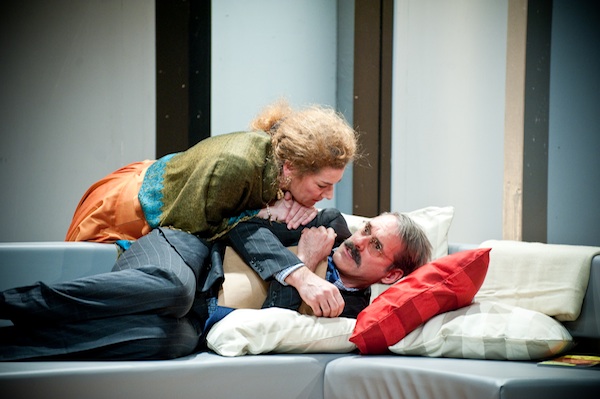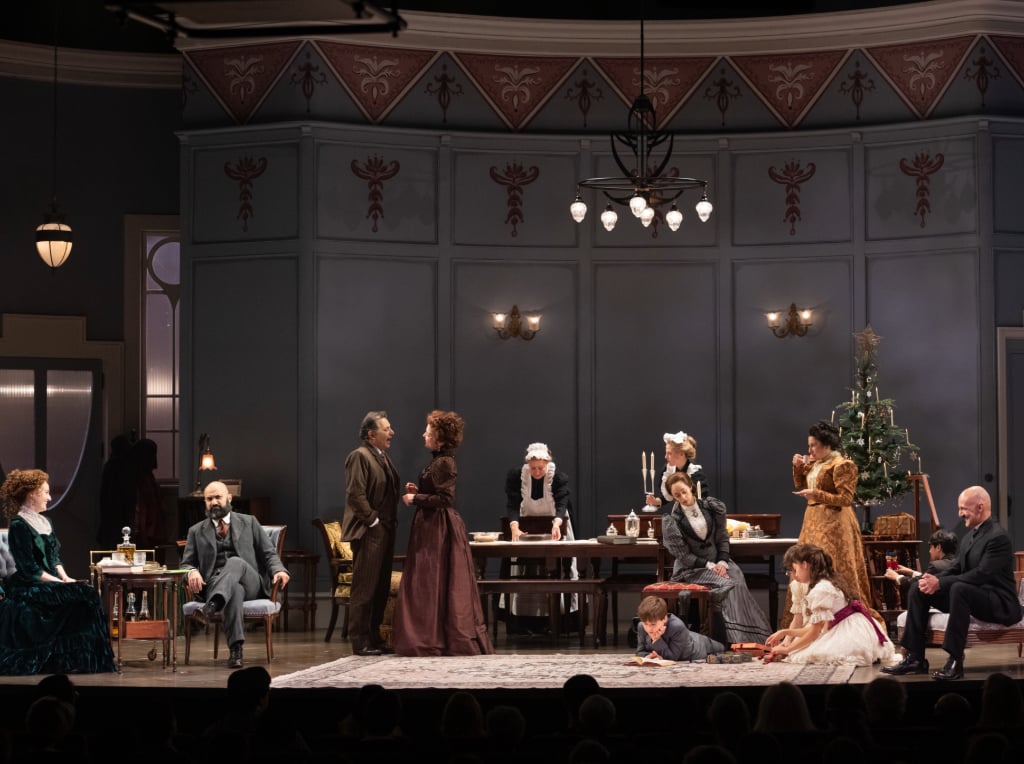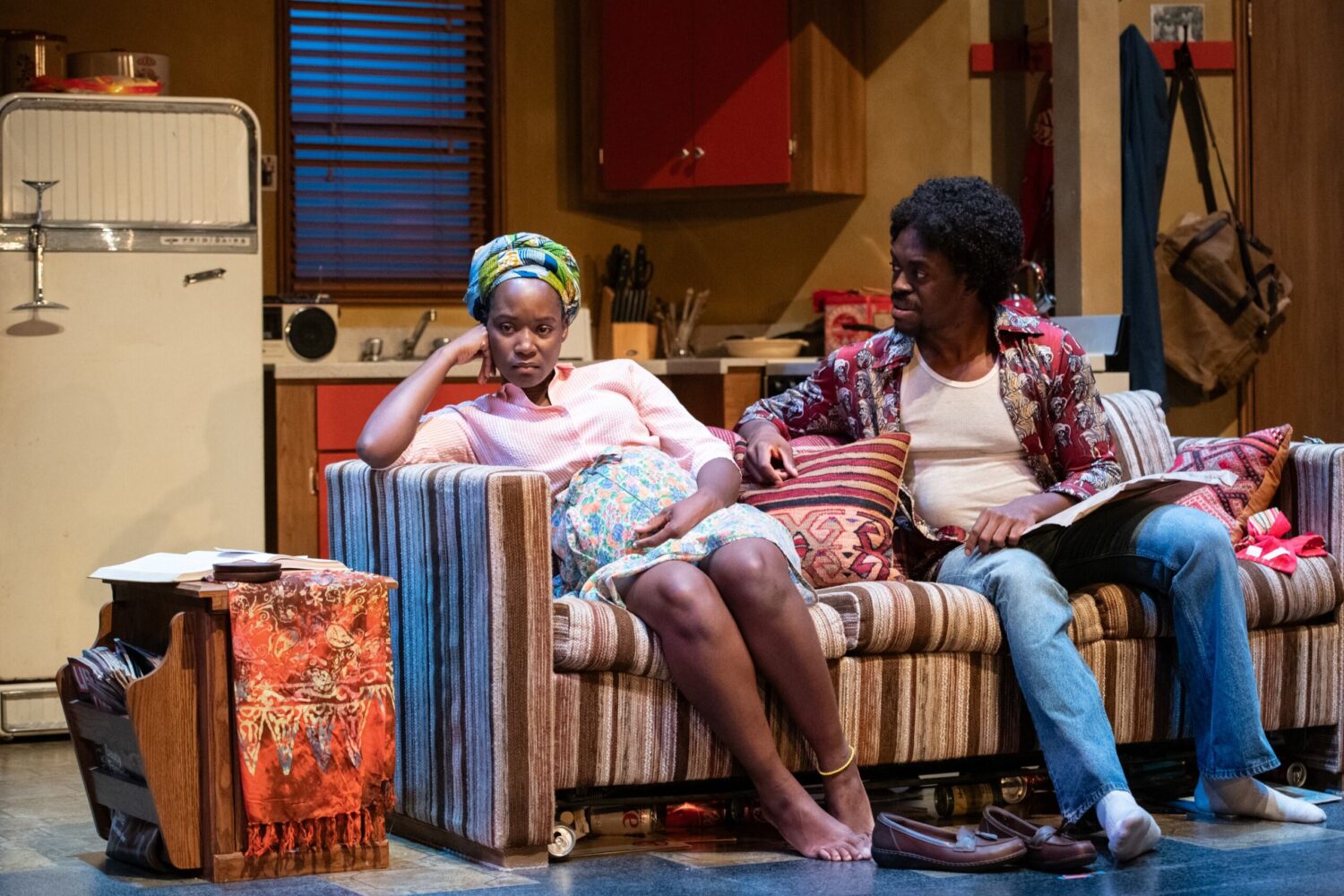Kerry Waters and Lee Ordeman in Scena Theatre’s production of Hedda Gabler. Photograph by Mason Summers.

There’s a reason Hedda Gabler is one of the most coveted roles in theatrical history. She’s Ibsen’s most complicated and divisive heroine, drawing sympathy from some, contempt from others. Enigmatic and alluring, she commands attention and fascination from all.
That’s why it’s so puzzling—and frustrating—that it’s hard to make any significant emotional connection to Kerry Waters’s interpretation of the title character in Scena Theatre’s Hedda Gabler. Waters’s Hedda is all eye rolls, pursed lips, and exaggerated sighs. She’s got Hedda’s boredom with suburban life down, for sure, but Waters (older enough than the character for it to be a distraction) doesn’t embody the role with any of its essential contradictions and complexities. She also fails to convincingly draw the kind of obsessive devotion and attraction from her three would-be suitors that the part requires. Ultimately, Waters feels like a Hedda with first-world problems.
It’s a shame, because for Hedda Gabler, the stakes are very high indeed. Recently married to a middling academic, George Tesman ( Lee Ordeman, all mugging and nervous energy), who’s struggling to keep up with her lifestyle and demands, Hedda is a woman independent enough to want to reject the path society has laid out for her, but lacking either the courage to do otherwise or the resignation to make peace with the life she has chosen.
Instead, she amuses herself with machinations and manipulations, inserting herself into others’ dramas for her own entertainment. Chiefly, she comes between a former admirer, the brilliant author and philosopher Eilert Lovborg ( Eric Lucas), and the reformed, less salacious life he is trying to build with the fresh-faced Thea Elvsted, who’s on a mission to “save” him. Lovborg isn’t the only man eager to rekindle a flame with Hedda. There’s also the cavalier and creepy Judge Brack ( Jim Jorgensen), who’s doing his best to worm his way back into her life, not completely without encouragement.
Where Scena’s production does work is in the fresh, contemporary translation from Irish playwright Brian Friel ( Dancing at Lughnasa), who brings an appealing clarity to the play’s dialogue. In particular, Friel gives Judge Brack an endearing, slightly anachronistic love for American language, peppering his phrases with slang expressions (not always used correctly), ranging from “making whoopee” to “razzle dazzling.” It gives new energy and depth to the play’s most clear-cut villain. Jorgensen, for his part, is the most fun to watch onstage, reveling in Brack’s slick, devilish nature.
Friel’s words mesh well with director Robert McNamara’s decision to set the play in late-1930s Norway, shown through the characters’ style of dress and home decor. Designer Andrew F. Griffin’s lighting infuses the play with additional warmth and emotional contrast between scenes. It would have been nice to see a bit more subtlety inMegan Holeva’s costuming of Hedda—an ill-fitting orange dress seems to exaggerate the characters’ commentary that Hedda is “filling out,” doing more than hint at the fact she may be with child.
A lack of nuance in general is the chief problem of Scena’s take on Hedda Gabler. As Hedda’s dim maid, Bertha, Mary Suib veers into unintentional comedy with her cluelessness. As the righteous Thea, Danielle Davy starts on a note of near hysteria and only gets more anxious and frenetic from there. The play’s final, climactic scene is stripped of its power with hand-wringing and wailing. Ibsen might have helped shape realism in theater, but many of Scena’s performers feel anything but natural inhabiting his roles.
Hedda Gabler runs through January 29 at H Street Playhouse. Tickets ($20 to $35) are available through Scena’s Web site.

















